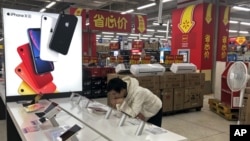American technology company Apple has reportedly asked its major suppliers to move 15 to 30 percent of their production outside of China. The company hopes to avoid higher tariffs on Apple exports to the United States.
The move is expected to hurt Apple’s profits and lead to massive job losses in China.
Within the last year, experts say, similar changes have taken place for other China-based technology suppliers. And, this will continue if the trade war between the U.S. and China intensifies.
Sean Kao is a top research manager at IDC Taiwan, a tech business advisory service. He told VOA that many Taiwanese electronics suppliers and other tech manufacturers have moved part of their assembly lines outside of mainland China.
Caught in the conflict
Technology companies like Apple face heavy punitive taxes on products they make in China for U.S. markets.
Earlier this month, U.S. President Trump said he was considering putting tariffs on another $300 billion worth of Chinese goods. He said he would decide after he meets with Chinese President Xi Jinping at the G-20 conference in Japan later this week.
Financial newspaper Nikkei Asian Review reported last week that Apple is planning on production changes to avoid tariffs. The newspaper did not provide its source for this information.
The report said Apple has asked its major iPhone assemblers to examine the cost of moving their iPhone production lines in China to other Asian countries. The assemblers include Foxconn Technology, Pegatron and Wistron.
Apple has not commented publicly on the report.
Wistron and Foxconn have already made some moves, setting up factories in Bangalore and Chennai, India. But Kao says the main purpose behind those moves was to sell to the Indian market.
Terry Guo is founder and general manager of Foxconn. He said his company already is able to produce Apple products outside of China to meet demand by the U.S. market.
Pegatron is also preparing to set up assembly lines in Indonesia, Kao added.
Production changes
These factory moves will make it possible to assemble U.S. iPhones outside China when necessary, says Liu Meng-chun. He is director of the CIER (Chung-Hua Institution of Economic Research) in Taipei.
China’s neighbors including India, Vietnam, Indonesia and Taiwan are seeing the profits, he said.
In the first five months of the year, for example, Taiwan’s exports to the U.S. grew by 15 percent.
And U.S. government data showed that imports from Vietnam grew 40.2 percent in the first quarter of 2019.
But China is being hurt by the changes, he added.
He said, “There have been massive job losses and China is facing a problem of growing unemployment.”
China last week said its employment rate remains stable and the service industry was a larger part of the job market last year.
Government data show the unemployment rate in cities remained at five percent in May, still below the yearly target of around 5.5 percent for 2019.
Job losses?
But China’s export industries are already seeing fewer jobs and lower pay. Factories are reportedly getting smaller, cutting extra work hours and moving overseas.
That is expected to hurt China’s long-term goal of growing the economy as the spending power of its 280 million migrant workers is affected.
So far, only lower-value assembly lines are moving overseas, Liu notes. When higher-value ones move, China will see greater effects.
But, Kao says, if U.S. companies dismiss skilled Chinese workers, those workers may seek jobs with local companies leading to greater innovation in China.
I’m Alice Bryant.
Joyce Huang wrote this story for VOA News. Alice Bryant adapted it for Learning English. Caty Weaver was the editor.
________________________________________________________________
Words in This Story
tariff - n. a tax on goods coming into or leaving a country
manager – n. someone who is in charge of a business or department
assembly line – n. a line of machines and workers in a factory that build a product by passing work from one station to the next
location – n. a place or position
data – n. facts or information used usually to calculate, analyze, or plan something
stable – adj. in a good state or condition that is not easily changed or likely to change
migrant – adj. a person who goes from one place to another especially to find work
innovation – n. the act or process of introducing new ideas, devices, or methods








